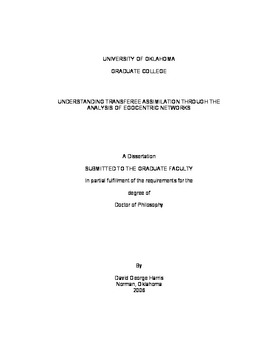| dc.contributor.advisor | O'Hair, Dan, | en_US |
| dc.contributor.author | Harris, David George. | en_US |
| dc.date.accessioned | 2013-08-16T12:20:06Z | |
| dc.date.available | 2013-08-16T12:20:06Z | |
| dc.date.issued | 2006 | en_US |
| dc.identifier.uri | https://hdl.handle.net/11244/1018 | |
| dc.description.abstract | This project expanded on early research and examined employees as they began a new job after undergoing an intra-organizational job transfer. Consistent with earlier research the results demonstrated support for the ideas that certain characteristics of egocentric networks can be used to predict the ability of transferees to successfully assimilate. Specifically, this study examined the informational and friendship egocentric networks that transferees develop and analyzed how these networks influenced the mechanisms thought to most significantly influence organizational assimilation: (a) task mastery, (b) role clarity, (c) knowledge about the parent organization, (d) social integration, and (e) organizational commitment. The size and range of egocentric networks were found to support assimilation in all tests conducted. Density and tie strength displayed partial support for the hypotheses tested. The status of egocentric networks did not support any of the hypotheses as predicted. | en_US |
| dc.description.abstract | A great deal of research has been conducted over the past two decades focusing on the concept of organizational assimilation. This research has taken many approaches and made much progress. It is now understood that assimilation is an interactive process involving both the organization's attempts to mold the newcomer, and the newcomer's attempts to carve out an individualized niche within the acceptable bounds of the work center and organization. | en_US |
| dc.description.abstract | However, much of this research ignores the interactive process and focuses either on the organizations molding efforts, or the newcomer's information-seeking behaviors that are used to personalize the position. Furthermore, the majority of literature addresses assimilation of individuals that are entering the work force for the very first time, while largely ignoring inter- and intra-organizational job transitions. Only recently have researchers begun to examine the informal social networks that newcomers form and how these networks influence the assimilation process. | en_US |
| dc.format.extent | x, 153 leaves ; | en_US |
| dc.subject | Socialization. | en_US |
| dc.subject | Psychology, Industrial. | en_US |
| dc.subject | Employee orientation. | en_US |
| dc.subject | Business Administration, Management. | en_US |
| dc.subject | Social networks. | en_US |
| dc.title | Understanding transferee assimilation through the analysis of egocentric networks. | en_US |
| dc.type | Thesis | en_US |
| dc.thesis.degree | Ph.D. | en_US |
| dc.thesis.degreeDiscipline | Department of Communication | en_US |
| dc.note | Source: Dissertation Abstracts International, Volume: 67-02, Section: A, page: 0630. | en_US |
| dc.note | Adviser: Dan O'Hair. | en_US |
| ou.identifier | (UMI)AAI3208233 | en_US |
| ou.group | College of Arts and Sciences::Department of Communication | |
